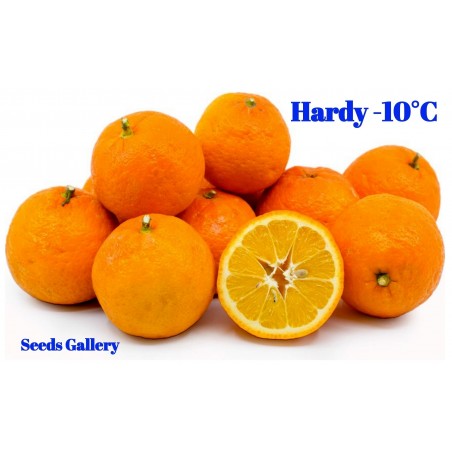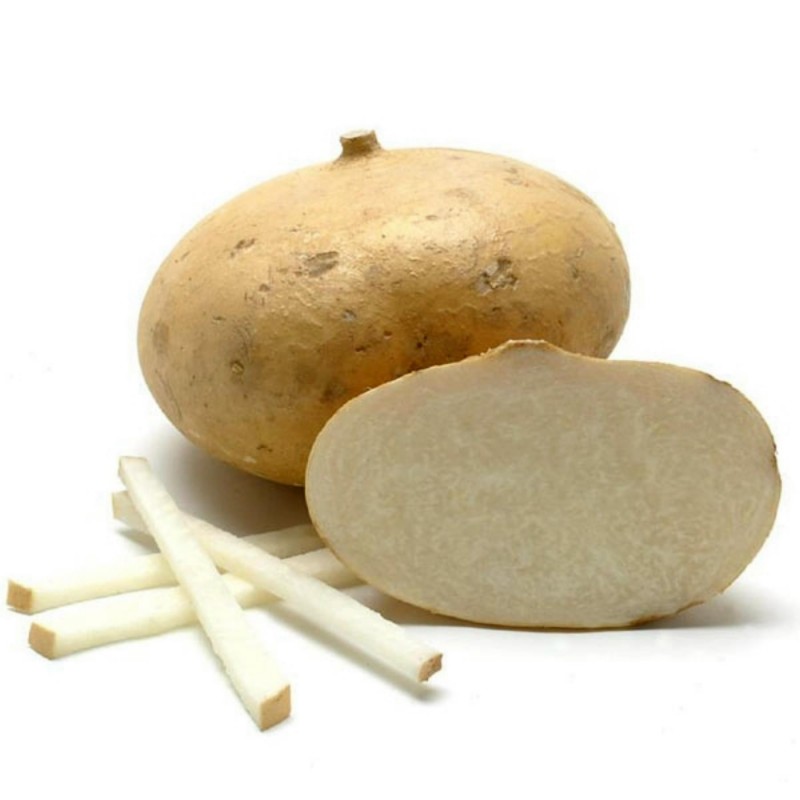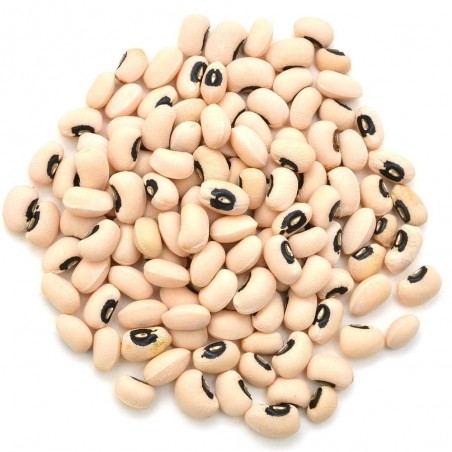
Jicama - Mexican Yam Bean Seeds (Pachyrhizus erosus)
Jicama - Mexican Yam Bean Seeds (Pachyrhizus erosus)
Price for Package of 5 seeds.
Pachyrhizus erosus, commonly known as jicama (/ˈhɪkəmə/ or /dʒɪˈkɑːmə; Spanish jícama About this sound, from Nahuatl xīcamatl, Mexican yam bean, or Mexican turnip
Jicama - Mexican Yam Bean Seeds (Pachyrhizus erosus)
Price for Package of 5 seeds.
Pachyrhizus erosus, commonly known as jicama (/ˈhɪkəmə/ or /dʒɪˈkɑːmə/[1]; Spanish jícama About this sound [ˈxikama] (help·info); from Nahuatl xīcamatl, [ʃiːˈkamatɬ]), Mexican yam bean, or Mexican turnip, is the name of a native Mexican vine, although the name most commonly refers to the plant's edible tuberous root. Jícama is a species in the genus Pachyrhizus in the bean family (Fabaceae). Plants in this genus are commonly referred to as yam bean, although the term "yam bean" can be another name for jícama. The other major species of yam beans are also indigenous within the Americas.
Flowers, either blue or white, and pods similar to lima beans, are produced on fully developed plants. Several species of jicama occur, but the one found in many markets is Pachyrhizus erosus. The two cultivated forms of P. erosus are jicama de agua and jicama de leche: both named for the consistency of their juice. The leche form has an elongated root and milky juice while the agua form has a top-shaped to oblate root, a more watery translucent juice, and is the preferred form for market.
Botany
Other names for jicama include Mexican potato, ahipa, saa got, and Chinese potato. In Ecuador and Peru, the name jicama is used for the unrelated yacón or Peruvian ground apple, a plant of the sunflower family whose tubers are also used as food.
The jícama vine can reach a height of 4–5 m given suitable support. Its root can attain lengths of up to 2 m and weigh up to 20 kg. The heaviest jícama root ever recorded weighed 23 kg and was found in 2010 in the Philippines (where they are called singkamas).[4] Jicama is frost-tender and requires 9 months without frost for a good harvest of large tubers or to grow it commercially. It is worth growing in cooler areas that have at least five months without frost, as it will still produce tubers, but they will be smaller. Warm, temperate areas with at least five months without frost can start seed 8 to 10 weeks before the last spring frost. Bottom heat is recommended, as the seeds require warm temperatures to germinate, so the pots will need to be kept in a warm place. Jicama is unsuitable for areas with a short growing season unless cultured in a greenhouse. Growers in tropical areas can sow seed at any time of the year. Those in subtropical areas should sow seed once the soil has warmed in the spring.
In cooking
The root's exterior is yellow and papery, while its inside is creamy white with a crisp texture that resembles raw potato or pear. The flavor is sweet and starchy, reminiscent of some apples or raw green beans, and it is usually eaten raw, sometimes with salt, lemon, or lime juice, alguashte, and chili powder. It is also cooked in soups and stir-fried dishes. Jícama is often paired with chili powder, cilantro, ginger, lemon, lime, orange, red onion, salsa, sesame oil, grilled fish, and soy sauce.[6] It can be cut into thin wedges and dipped in salsa. In Mexico, it is popular in salads, fresh fruit combinations, fruit bars, soups, and other cooked dishes. In contrast to the root, the remainder of the jícama plant is very poisonous; the seeds contain the toxin rotenone, which is used to poison insects and fish.
Spread to Asia
Spaniards spread cultivation of jícama from Mexico to the Philippines (where it is known as singkamas, from Nahuatl xicamatl),[8] from there it went to China and other parts of Southeast Asia, where notable uses of raw jícama include popiah, fresh lumpia in the Philippines and salads in Indonesia, Singapore and Malaysia such as yusheng and rojak.
In the Philippines, jícama is usually eaten fresh with condiments such as rice vinegar and sprinkled with salt, or with bagoong (shrimp paste). In Malay, it is known by the name ubi sengkuang. In Indonesia, jícama is known as bengkuang. This root crop is also known by people in Sumatra and Java[citation needed], and eaten at fresh fruit bars or mixed in the rojak (a kind of spicy fruit salad). Padang a city in West Sumatra is called "the city of bengkuang". Local people might have thought that this jícama is the "indigenous crop" of Padang. The crop has been grown everywhere in this city and it has become a part of their culture.[9]
It is known by its Chinese name bang kuang to the ethnic Chinese in Southeast Asia. In Mandarin Chinese, it is known as dòushǔ(豆薯) or liáng shǔ (涼薯), as sa1 got3 沙葛 (same as "turnip") in Yue Chinese/Cantonese, and as mang-guang 芒光 in Teochew, where the word is borrowed from the Malay, and as dìguā 地瓜 in Guizhou province and several neighboring provinces of China, the latter term being shared with sweet potatoes. Jícama has become popular in Vietnamese food as an ingredient in pie, where it is called cây củ đậu (in northern Vietnam) or củ sắn or sắn nước (in southern Vietnam).
In Japanese, it is known as 葛芋 (kuzu-imo). In Myanmar, it is called စိမ်းစားဥ (Sane-saar-u). Its Thai name is มันแกว (man kaeo).[10] In Cambodia, it is known as ដំឡូងរលួស /dɑmlɔoŋ rəluəh/ or under its Chinese name as ប៉ិកួៈ ~ ប៉ិគក់ /peʔkŭəʔ/.[11] In Bengali, it is known as shankhalu (শাঁখআলু), literally translating to "conch (shankha, শাঁখ) potato (alu, আলু)" for its shape, size and colour. In Hindi, it is known as mishrikand (मिश्रीकंद). It is eaten during fast (उपवास) in Bihar (India) and is known as kesaur (केसौर). In Odia, it is known as (ଶଙ୍ଖସାରୁ) Shankha Saru. In Laos, it is called man phao (ມັນເພົາ),[12] smaller and tastes a little sweeter than the Mexican type. It is used as a snack by peeling off the outer layer of the skin, then cutting into bite sizes for eating like an apple or a pear.
Nutrition
Jícama is high in carbohydrates in the form of dietary fiber. It is composed of 86–90% water; it contains only trace amounts of protein and lipids. Its sweet flavor comes from the oligofructose inulin (also called fructo-oligosaccharide) which is a prebiotic. Jícama is very low in saturated fat, cholesterol, and sodium. It is also a good source of vitamin C.
Storage
Jícama should be stored dry, between 12 and 16 °C (53 and 60 °F). As colder temperatures will damage the roots, jicama should not be refrigerated. A fresh root stored at an appropriate temperature will keep for a month or two.
| HEIRLOOM ? | Yes |
|---|---|
| Organic Seeds ? | Organic Seeds |
| Edible ? | Edible |
| Pretreatment of sowing ? | Soak in water before sowing 12-24 h |
| Sowing depth ? | Sowing depth 4 cm |
| Perennial ? | Perennial plant : Yes |
| Ručně vybraná semena? | Ručně vybraná semena |
| Resistant to cold and frost ? | Resistant to cold and frost |
| Plant is suitable for growing ? | The plant is suitable for growing in a greenhouse The plant is suitable for outdoors cultivation |
| Seeds Gallery recommend this plant ? | Seeds Gallery recommend this plant! |
| Medicinal Plant ? | Medicinal Plant: Yes |


Vaše hodnocení nelze odeslat
Nahlásit komentář
Zpráva odeslána
Váš podnět nelze odeslat
Napište svůj názor
Zkontrolovat před odesláním
Vaši recenzi nelze odeslat
🌍 Globální doručení z EU
Zásilky odesíláme do celého světa z Evropské unie prostřednictvím registrované pošty s potvrzením o doručení.
📦 Sledování zásilky
Pro sledování zásilky se přihlaste ke svému účtu a přejděte do sekce Historie objednávek > Detail, kde najdete sledovací číslo.
Mezinárodní sledování: 17Track
Pro čísla jako RGxxxxxxHR: Posta.hr sledování
🕒 Informace o sledování jsou dostupné až 24 hodin po odeslání zásilky.
⚠️ Důležité upozornění
Dobírka není možná.
Pravidelně kontrolujte složku spam / nevyžádaná pošta ve své e-mailové schránce.
Používejte pouze kontaktní formulář na našich stránkách.
E-maily zaslané přímo na naši adresu nemusí být přijaty.
📱 Povinné telefonní číslo
Při objednávce uveďte své mobilní číslo s předvolbou země.
Příklad: +420 123 456 789
🚚 Podmínky doručení
Registrované zásilky vyžadují podpis příjemce.
Neobjednávejte, pokud:
chcete doručení do poštovní schránky
nebudete doma k převzetí zásilky
chcete, aby balík byl doručen sousedovi (❌ není možné)
📬 Pokud zadáte adresu poštovní schránky a zásilka bude ztracena, nemáte nárok na vrácení peněz.
↩️ Vrácení zásilky a opětovné odeslání
Pokud je zásilka z jakéhokoliv důvodu vrácena zpět k nám:
Budete hradit náklady na zpětné zaslání 2 €
A také náklady na opětovné odeslání
⏱ Zpoždění a sledování
Pokud sledování ukazuje, že zásilka je stále u odesílatele, znamená to, že je na cestě.
Kontaktujte místní poštu s číslem sledování pro aktuální informace.
Nejsme poštovní službou a zásilku za vás nesledujeme.
Nezodpovídáme za dobu doručení.
🔍 Vyšetřování ztráty zásilky lze zahájit až 30 dní po odeslání.
✈️ Možnosti dopravy
| Typ dopravy | Doba zpracování | Pojištění | Možné zpoždění | Poznámka |
|---|---|---|---|---|
| Standardní | 7–10 pracovních dnů | ❌ | 7–14 pracovních dnů | Nejlevnější možnost |
| Prioritní | 1–7 pracovních dnů | ❌ | 3–10 pracovních dnů | Prioritní zpracování – ne nutně rychlejší doručení |
| Pojištěná | 1–7 pracovních dnů | ✅ | 3–10 pracovních dnů | Vrácení peněz při ztrátě (do 150 €) |
🕒 Odhadovaná doba doručení:
V rámci EU: 3–20 pracovních dnů
Celosvětově: 5–30 pracovních dnů
Příklady doby doručení do USA: 27, 22, 19, 17, 13 dnů
💳 Platební metody
💶 Bankovní převod (SEPA / IBAN / SWIFT-BIC)
Uveďte číslo objednávky v platebním příkazu (např. SGS-19811702).
Chybějící reference může způsobit zpoždění nebo zrušení objednávky.
Pokud platba nedorazí do 7 dnů, objednávka bude automaticky zrušena.
🅿️ PayPal
Přijímáme platby pouze v eurech.
Nastavte měnu na euro při platbě.
💳 Platba kartou
Platby kartou probíhají přes náš web: Exotic Seeds Store
Akceptujeme Visa, MasterCard, American Express, Diners Club, UnionPay, JCB, Discover a další.
💡 Zákazník hradí všechny transakční poplatky.
Pro rychlejší vyřízení objednávky pošlete potvrzení o platbě.
📅 Další informace
Objednávky nevyřizujeme a neodesíláme o víkendech (sobota a neděle).
Před objednáním si vždy přečtěte důležitá oznámení na našem webu (svátky, speciální podmínky atd.).
📫 Pozor:
Neposílejte nám zprávy přímo na e-mail. Používejte pouze kontaktní formulář na našem webu.
Related Products



























